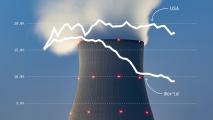To combat food waste, grocery stores are using a dynamic pricing technology called “Wasteless,” which automatically discounts food as it nears its expiration date.
Why it matters: Food waste is a huge problem. Every year, retailers in the U.S. throw away approximately 10.5 million tons of food — often because items expired or were close to expiring. This food usually ends up in landfills.
The challenge: Dynamic pricing is a strategy where the price of a good or service changes in real time, in response to changes in supply and demand — if you’ve ever had to pay more for an Uber because you hailed a ride during rush hour, you’ve already had firsthand experience with it.
Grocery stores use dynamic pricing, too — they might discount milk nearing its expiration date to encourage shoppers to buy those gallons first. However, that usually requires workers to manually find and label each item and maybe even move it to a clearance section of the store.
Not only does that require time and effort, it can also drive off some customers.
“Any time a product has been removed from its regular section, slapped with a different-colored price tag, or even labeled as being discounted, the product immediately acquires a stigma in the mind of the consumer,” Wasteless CEO Oded Omer told Fast Company.
The Wasteless approach: Wasteless uses technology to overcome some of the existing limitations with dynamic pricing at grocery stores.
Stores using Wasteless don’t have to retag or move any items — instead, electronic shelf labels display multiple prices correlating to different expiration dates. The label in front of the milk, for example, might display a price of $3 for the gallons expiring in one week and $3.50 for those expiring in two weeks.
Grocers don’t need to manually enter these prices into the labels, either. Wasteless has developed a dynamic pricing algorithm that determines the price most likely to minimize food waste and maximize revenue. It then automatically updates the label multiple times a day.
The model has been flipped.
Oded Omer
Items with longer shelf lives will cost most than those about to expire, but the price is determined by other factors, too, such as the available stock and the time of day. A premade salad, for example, might cost more around lunch time than 8 PM, but the salad with the longer shelf life will always cost more.
“Now, consumers can make shopping decisions that reward their sustainable behavior, and there is no stigma that the shopper is sacrificing anything or buying second-rate items,” Omer said. “The model has been flipped, so the consumer sees a longer shelf life as a premium that can be paid.”
Small potatoes: Wasteless believes its model could help stores reduce food waste by up to 80%, but so far, only a few retailers have actually tested out the tech.
The company is reportedly in talks with larger chains, though, and if one of those decides to buy in, we could get a chance to see what impact tech-powered dynamic pricing could really have on grocery store food waste.
We’d love to hear from you! If you have a comment about this article or if you have a tip for a future Freethink story, please email us at [email protected].






